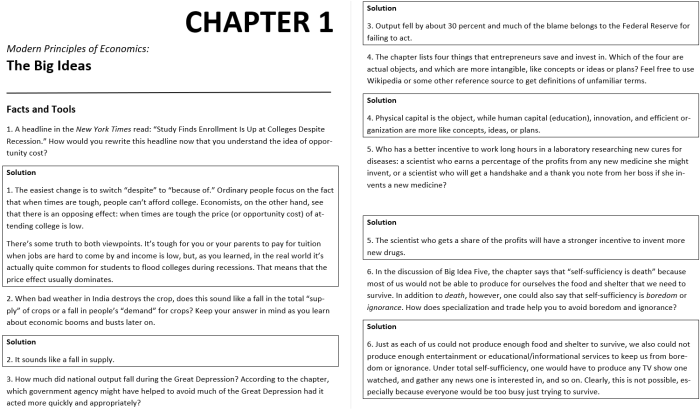Tyler cowen and alex tabarrok modern principles microeconomics – Tyler Cowen and Alex Tabarrok’s Modern Principles of Microeconomics stands as a seminal work in the field, offering a comprehensive and contemporary exploration of the fundamental principles that govern economic behavior.
This groundbreaking text presents a unique approach to microeconomic theory, synthesizing insights from behavioral economics, game theory, and institutional economics to provide a nuanced understanding of how individuals and firms interact in markets.
Introduction to Tyler Cowen and Alex Tabarrok’s Modern Principles of Microeconomics

Tyler Cowen and Alex Tabarrok’s Modern Principles of Microeconomicsis a comprehensive textbook that presents a modern and rigorous approach to the study of microeconomics. The book’s authors are renowned economists who have made significant contributions to the field. Cowen is a professor of economics at George Mason University and a Bloomberg View columnist, while Tabarrok is a professor of economics at George Mason University and a co-author of the popular economics blog Marginal Revolution.
Modern Principles of Microeconomicsis distinguished by its emphasis on economic theory and its use of real-world examples to illustrate economic concepts. The book provides a thorough introduction to the fundamental principles of microeconomics, including supply and demand, elasticity, and market equilibrium. It also explores more advanced topics such as market structures, consumer behavior, production and cost analysis, firm behavior, and welfare economics.
Key Concepts and Theories in Modern Microeconomics: Tyler Cowen And Alex Tabarrok Modern Principles Microeconomics
The fundamental principles of microeconomics, as presented in Modern Principles of Microeconomics, include the following:
- Supply and demand:The relationship between the quantity of a good or service that producers are willing to supply and the quantity that consumers are willing to demand.
- Elasticity:The responsiveness of supply or demand to changes in price or other factors.
- Market equilibrium:The point at which the quantity of a good or service that producers are willing to supply is equal to the quantity that consumers are willing to demand.
These principles are essential for understanding how markets work and how they affect the allocation of resources in an economy.
Market Structures and Competition
Modern Principles of Microeconomicsanalyzes the different types of market structures, including:
- Perfect competition:A market in which there are many buyers and sellers, and each firm produces an identical product.
- Monopoly:A market in which there is only one seller.
- Oligopoly:A market in which there are a few large firms that dominate the market.
The book discusses the characteristics and behavior of firms in each market structure and explains how market structure affects economic outcomes.
Consumer Behavior and Market Demand
Modern Principles of Microeconomicsdescribes the theory of consumer behavior and its implications for market demand. The book explains the concept of utility maximization and the role of preferences and constraints. It also discusses factors that influence consumer demand, such as income, prices, and advertising.
Production and Cost Analysis
Modern Principles of Microeconomicsanalyzes the theory of production and the concept of production functions. The book discusses the different types of costs faced by firms, such as fixed costs, variable costs, and marginal costs. It also explains the relationship between production and costs.
Firm Behavior and Market Equilibrium
Modern Principles of Microeconomicsdescribes the theory of firm behavior and its implications for market equilibrium. The book explains the concept of profit maximization and the role of revenue and costs. It also discusses factors that influence firm behavior, such as market structure and technology.
Welfare Economics and Market Failures
Modern Principles of Microeconomicsanalyzes the concept of welfare economics and its implications for government intervention. The book discusses market failures, such as externalities, public goods, and asymmetric information. It also explains the role of government policies in addressing market failures.
FAQ Section
What is the significance of Cowen and Tabarrok’s Modern Principles of Microeconomics?
This text offers a comprehensive and contemporary exploration of microeconomic theory, integrating insights from behavioral economics, game theory, and institutional economics.
How does this book contribute to the field of microeconomics?
Cowen and Tabarrok provide a unique approach to microeconomic theory, synthesizing insights from multiple disciplines to provide a nuanced understanding of economic behavior.